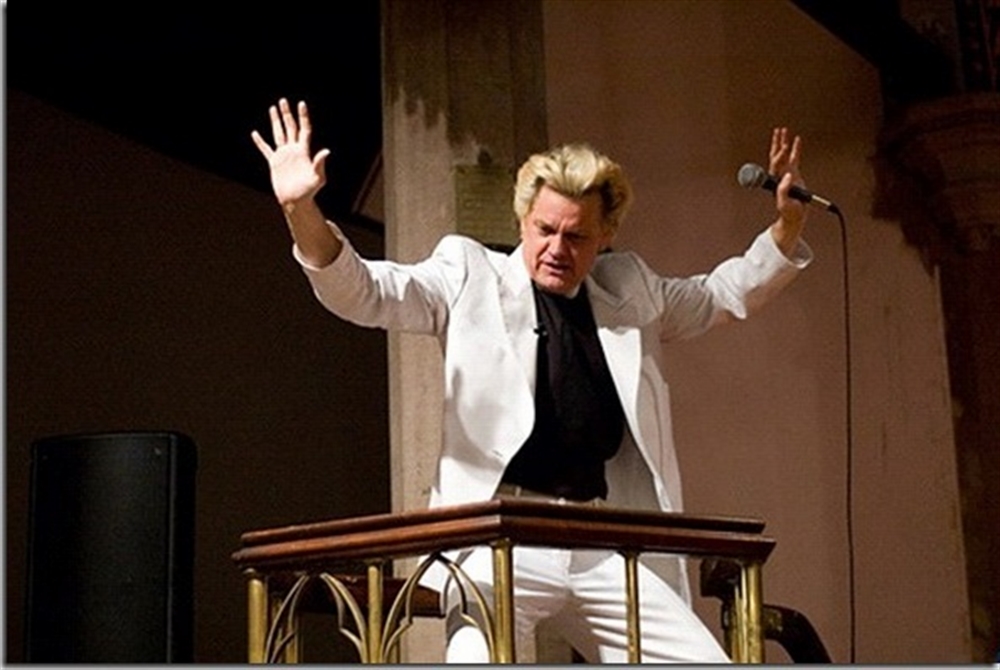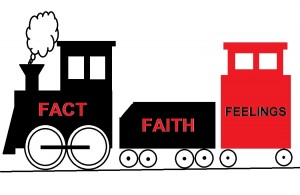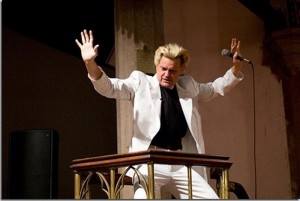The speaker was persuasive and moving. He asked us to hug a friend, stomp on the floor, and even pinch our own forearms. It didn’t hurt that he could have been a GQ model: six foot three, blond-haired, blue-eyed, and funny. When he looked each of us in the eye, we felt his personal care.

The conference theme was Knowing God. Its most popular presenter was this man with passion for feeling God’s love:
- He asked, “How can we know God’s love?”
- He answered, “We feel love in the hug, we sense the solid floor in the stomp, and we experience pain in the pinch.”
- He argued, “God knows our frame, our need for hugs; he longs for us to detect his touch. And that is how we’ll know his love. When we feel it.”

He scorned the old evangelical formula, “Fact–Faith–Feeling” with its mundane illustration of a train: the locomotive represents “fact,” the coal-car “faith,” and the caboose “feelings.”
If we put our faith (fuel) in the facts (locomotive), our feelings will follow. He snickered at its antiquated answer.
“That perversion,” he laughed, “is completely contrary to the God-man of the gospels. Jesus was a man of compassion. We know his love only when we feel it. Feelings teach us facts.”
Well, I feel a bit unsure about his answer; and that’s a fact
The truth is, our feelings are always little helpless cabooses, pulled about by greater powers. They always follow whatever we believe to be reality:
- We feel unimportant when we believe we are unimportant to others, so we’re sad;
- We feel rejected when believe that everyone will reject us, thus we’re angry;
- We feel we will fail at our next job application because we believe we will screw up the interview, the result is we feel scared.
Our thoughts about reality inflame our emotions. Always. Emotions, however, take milliseconds to react to our beliefs, so our emotions feel like they reveal reality. But they don’t.
Our emotions are signposts to hidden beliefs, they are not revealers of truth.
Our emotional-perceptions are terrible observers of reality
A few years ago I wrote a blog that few people read, fewer people shared, and almost no one commented on. Thoughts race through my mind: my season of writing is over, no one resonates with what I say, and I better return to the world of business. I was dismayed.
I’m sure you recognize what happened: I experienced a single bad blog, and Iovergeneralized it to paint my entire life in black and white; I used one event as a crystal ball to forecast all my future plans; I jumped to the conclusion that this single rejection represented all of reality.
Our emotions are real, of course: we really do experience sadness, anger, and isolation. But as graphic artists, emotions only know how to draw distorted caricatures.
Which path will we take?
Julius Caesar claimed that “All men willing believe what they want to believe.”
We choose which reality we will trust. Emotions argue that feelings paint the world as it really is, and we should put our trust in them. Wisdom argues the opposite.
Christianity is the only religion in which the facts of history are central. If you doubt the miracles of Buddha or Mohammed, you can still live a good religious life by following their teachings. But Christianity rests on historical facts: that God became human, he died out of great love for us, he rose from the dead, and he sent his Spirit to live inside of us.
What emotional “truth” will solve our despair when our feelings tell us we will never be loved, or we will always be rejected, or we will never find satisfying work? Looking for emotional answers to resolve emotional dismay is like trying to extinguish fire with a gallon of gas.
Our only hope is the fact that God loves us without us lifting a finger. Choose to believethat and your caboose will follow: “If our heart condemns us, God is greater than our hearts.”
We always choose: either to believe our feelings even though God’s truth screams otherwise, or to believe God’s promises even when every feeling in our being mutinies.
A week after my ignored blog, my next article received twice as many reads, twice as many shares, and three times as many comments as any blog I had ever written before.
As revealers of reality, our feelings have the truth bearing capacity of a gnat. But as revealers of our unconsciously chosen beliefs (which are dragging us down), our feelings are more powerful than a locomotive.
Sam



 “Get up and win that race!”
“Get up and win that race!”
I like that Sam! Great picture 2:)
I was googling pictures, and I just couldn’t resist. I also couldn’t find out who it really is.
Thanks,
Sam